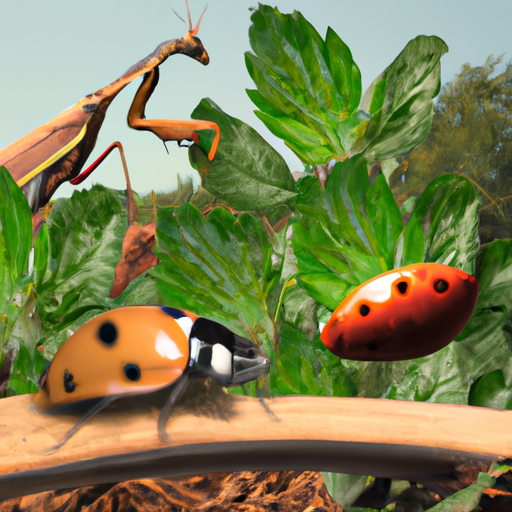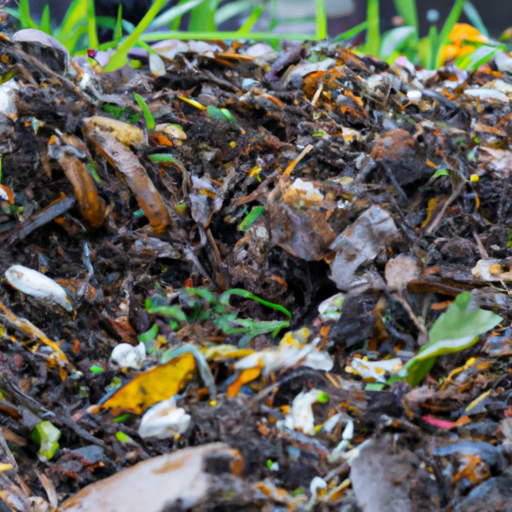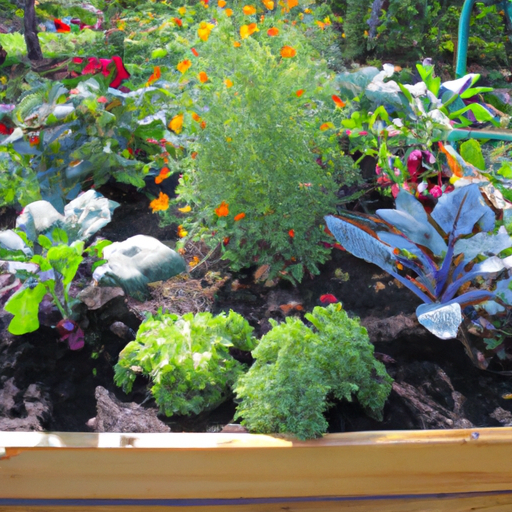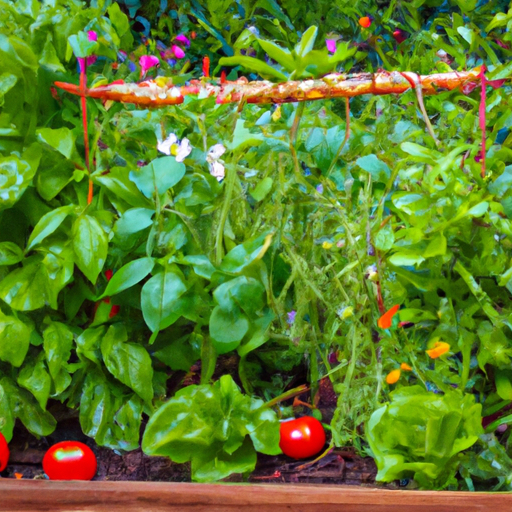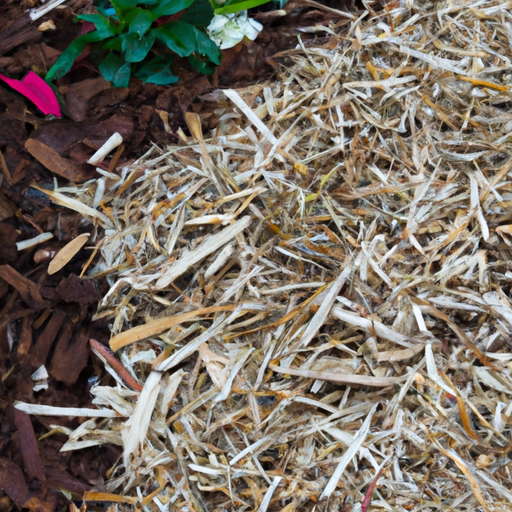Welcome fellow garden enthusiasts! As Master Gardeners, we are always looking for ways to maintain our gardens in a safe and eco-friendly manner. One of the biggest challenges that we face is keeping pests at bay without using harmful chemicals.
Fortunately, there are several biological pest control methods that can be used effectively in your garden. Biological pest control involves introducing natural predators or parasites into your garden ecosystem to control problematic insects or other pests. This method is not only safer for you and the environment but also reduces the risk of chemical resistance among pests.
In this article, we will explore some of these effective biological pest control methods that you can use in your garden to keep it healthy and thriving all season long. So let’s get started!
Natural Predators For Pest Control
As a Master Gardener, I always advocate for natural pest control methods.
Introducing decoy plants can be a great way to lure pests away from your precious crops while attracting beneficial birds that can help eliminate them.
For instance, planting marigolds or nasturtiums are known to attract hoverflies and ladybugs respectively which act as predators to aphids and other small insects.
Additionally, setting up birdhouses or birdbaths in your garden can attract insect-eating birds like bluebirds and chickadees who will help keep the pest population under control.
By utilizing these natural predator techniques, you’ll not only protect your garden but also create a thriving ecosystem within it!
Parasites That Target Garden Pests
When it comes to biological pest control in your garden, parasites can be a gardener’s best friend.
Parasitic wasps are one such example that help control pests like aphids and caterpillars by laying their eggs inside the insect host. As the larvae develop, they consume the host from the inside out, eventually killing it.
Nematode applications are another effective way to target specific pests like grubs and cutworms. These microscopic worms enter the pest’s body through natural openings or directly penetrate its skin, releasing bacteria that ultimately kill the pest.
Incorporating these beneficial parasites into your pest management plan can help reduce chemical pesticide use while still maintaining a healthy garden ecosystem.
Companion Planting For Pest Management
As a Master Gardener, I highly recommend companion planting for pest management in your garden.
Inter cropping benefits not only the soil but also helps to keep pests at bay.
By strategically planting certain plants together, you create an ecosystem that is less susceptible to insect infestations and other types of damage caused by pests.
Pest repellent plants such as basil, marigolds, and garlic can be intercropped with vegetables like tomatoes or peppers to help deter insects from damaging them.
These pest repellent plants emit natural chemical compounds that repel harmful bugs while attracting beneficial ones like bees and ladybugs.
So why rely on harsh chemicals when nature has provided us with safe alternatives?
Incorporate companion planting into your gardening routine and watch your garden thrive!
Beneficial Insects For Pest Control
As a Master Gardener, one of the most effective ways to control pests in your garden is by attracting beneficial insects. These insects are natural predators that feed on common garden pests like aphids, mites and caterpillars.
By creating habitats for these helpful creatures, you can maintain a healthy ecosystem in your garden without resorting to harmful chemicals. Some popular beneficial insects include ladybugs, lacewings and praying mantises.
To attract them to your garden, plant flowers such as daisies, sunflowers and marigolds which provide both food and shelter for these insects. You can also create habitat structures like insect hotels or leave undisturbed areas in your garden where they can nest and reproduce.
With some patience and strategic planning, you’ll soon have an army of allies helping to keep pesky pests at bay!
Using Organic Sprays To Control Garden Pests
While beneficial insects are great for controlling garden pests, sometimes they just aren’t enough. That’s where organic sprays come in handy! Yes, you read that right – as a Master Gardener, I’m actually suggesting using something to combat those pesky bugs besides our beloved insect friends.
But fear not, fellow green thumbs – managing pests without harming the beneficial insects is still completely possible with DIY organic spray recipes.
One recipe calls for mixing equal parts water and dish soap in a spray bottle and applying directly to plant leaves affected by aphids or mites. Another option is mixing garlic cloves and hot peppers in water overnight before straining and adding it to a spray bottle. This potent mixture can deter everything from beetles to caterpillars.
Remember to always test these sprays on a small area of your plants before spraying the entire thing, as some plants may be more sensitive than others. Additionally, I encourage you to incorporate other pest control methods like crop rotation and companion planting alongside these sprays for maximum effectiveness.
So go ahead and give these natural remedies a try – after all, who said gardening couldn’t also involve a little bit of chemistry?
Frequently Asked Questions
Are There Any Potential Risks Or Negative Effects Associated With Using Biological Pest Control Methods In My Garden?
When it comes to controlling pests in your garden, there are a variety of methods available.
While biological pest control can be effective and environmentally friendly, it’s important to consider the potential risks associated with this approach.
For example, introducing non-native species into an ecosystem can have unintended consequences and may ultimately do more harm than good.
Additionally, some natural predators may not be as effective at controlling certain types of pests compared to chemical pesticides or other methods.
To ensure that you’re making the best choice for your garden, it’s important to weigh the effectiveness of different approaches against any potential negative effects they may have on the environment or local wildlife.
How Do I Attract Natural Predators Or Beneficial Insects To My Garden?
To promote a healthy and thriving garden, it’s important to attract beneficial insects that can help control pests naturally.
Attracting these helpful predators is easy with a few simple techniques.
First, plant flowers such as marigolds or daisies that are known to attract pollinators like bees and butterflies.
Additionally, avoid using chemical pesticides or fertilizers which can harm the natural balance of your garden.
Consider creating habitats for beneficial insects by incorporating features like rock piles, birdhouses, or small ponds where they can live and thrive.
Overall, utilizing natural pest control techniques and attracting beneficial insects will not only keep your garden free from harmful pests but also create a sustainable ecosystem for all living creatures in your backyard.
As Master Gardeners, we understand the importance of maintaining this balance in order to ensure the health and longevity of our gardens.
Can I Use A Combination Of Different Biological Pest Control Methods For Maximum Effectiveness?
As a Master Gardener, I can tell you that combining different methods of pest control is always an effective way to keep your garden healthy and thriving.
By using multiple approaches, you increase the chances of success while minimizing potential harm to your plants or beneficial insects.
However, it’s important to assess the effectiveness of each method before adding another one into the mix.
So if you’re looking for ways to combat pests in your garden, consider combining various biological control methods – just remember to monitor their impact along the way!
How Long Does It Typically Take For Biological Pest Control Methods To Start Working In My Garden?
When implementing biological pest control methods in your garden, it’s important to understand the factors that can affect their efficacy.
One of these factors is time – you may be wondering how long it will take for the methods to start working.
The answer varies depending on a number of factors, such as the specific pests being targeted and the severity of the infestation.
In some cases, you may see results within a few days or weeks, while in others it could take several months.
It’s also worth noting that different types of biological controls work at different rates – for example, introducing beneficial insects like ladybugs can have an almost immediate impact, whereas using nematodes to target soil-dwelling pests may take longer to show results.
Overall, patience is key when it comes to biological pest control – but with careful planning and implementation, you’ll likely see positive results over time.
Are There Any Specific Plants Or Vegetables That Are More Susceptible To Certain Pests, And Therefore Require Different Biological Pest Control Methods?
Plant susceptibility is a critical factor to consider when it comes to dealing with pests in your garden.
Certain plants or vegetables are more prone to specific pest infestations, which means that you may need to adopt different pest control methods for each plant type.
For instance, tomatoes are highly susceptible to tomato hornworms and aphids, while cabbage is vulnerable to the diamondback moth larvae.
As such, it’s essential to identify the pests that attack your crops and choose pest-specific control methods that work best against them.
By doing so, you can enjoy healthy and thriving gardens throughout the year!
Conclusion
In conclusion, using biological pest control methods can be a safe and effective way to protect your garden from harmful insects. While there may be some risks associated with introducing new organisms into your environment, these are often outweighed by the benefits of creating a more balanced ecosystem in your backyard.
One interesting statistic that highlights the effectiveness of biological pest control is that ladybugs, which are natural predators of aphids and other common garden pests, can eat up to 5,000 aphids in their lifetime!
By attracting ladybugs and other beneficial insects to your garden through techniques like companion planting and providing habitat for pollinators, you can reduce or even eliminate the need for chemical pesticides.
As Master Gardeners, it is our duty to care for our gardens in a responsible and sustainable way. By utilizing different biological pest control methods tailored to the specific needs of our plants and vegetables, we can create thriving ecosystems that benefit both us and the environment.
So don’t hesitate to try out some new strategies this gardening season – your plants (and local wildlife) will thank you!
